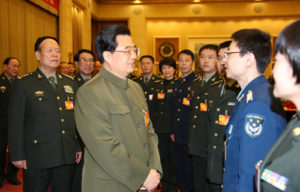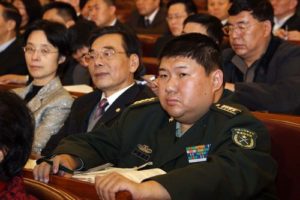This past Sunday in Beijing marked the closing of the National People’s Congress (NPC) and its more eclectic sidekick, the China People’s Political Consultative Congress, familiarly known in Chinese as lianghui, or “the two meetings.”

Hu Jintao at the 2010 NPC. Hu is clearly continuing his Mao-inspired fashion kick he debuted at last October's National Day parades.
Both are typically derided as “rubber-stamp” bodies, theatrical reenactments of democracy that give the public a vague whiff of political participation. While nothing happened this year to alter this assessment, some in China’s media displayed a notably bolder streak in covering the extravaganza and created interesting news themselves. A few of the interesting developments:
Most seized upon Li’s behavior as an unacceptably open display of contempt for journalists’ right to question officials and facilitate “supervision by public opinion” (舆论监督), a concept cherished by the public but disregarded by most officials in practice. Although this is hardly the first time in the last few years a Chinese official has gotten in trouble for showing disdain towards the public’s right to know, Li is certainly the most senior-ranking victim to be openly lambasted for such a transgression. The open letter demanding his resignation that has since emerged, signed by 210 journalists and intellectuals, is thus all the more notable.
On a lighter note, Chairman Mao’s grandson Mao Xinyu was on hand as a representative at the China People’s Political Consultative Congress (CPPCC).

Mao Xinyu listening to the Government Work Report at the CPPCC
Among other serious proposals offered by the body’s assemblage of celebrities, sports stars and the occasional leader (one fashion newspaper editor advocated that husbands be legally required to compensate their wives for housework), the portly descendant of the Great Helmsman pitched for “using Mao Zedong military thought to guide warfare in the information age” and “rearm the minds” of the military leadership. Mao is presently a researcher at the People’s Liberation Army’s Academy of Military Sciences and will be promoted to the rank of Major General this July, making him the youngest ranking general in the PLA.
When pressed in an interview to give a specific example of Mao Zedong thought applied to modern warfare, the 39 year-old Mao offered that the concept of People’s War needs to be applied to information-gathering in the modern age, that “as always, the people need to be mobilized to support” such efforts.
In the interview, Mao also claimed “American scholars do not fear China’s military modernization, they fear China’s military’s ‘Mao Zedong thought-ization.'” This comment drew ridicule from Chinese netizens in some quarters of the Internet.